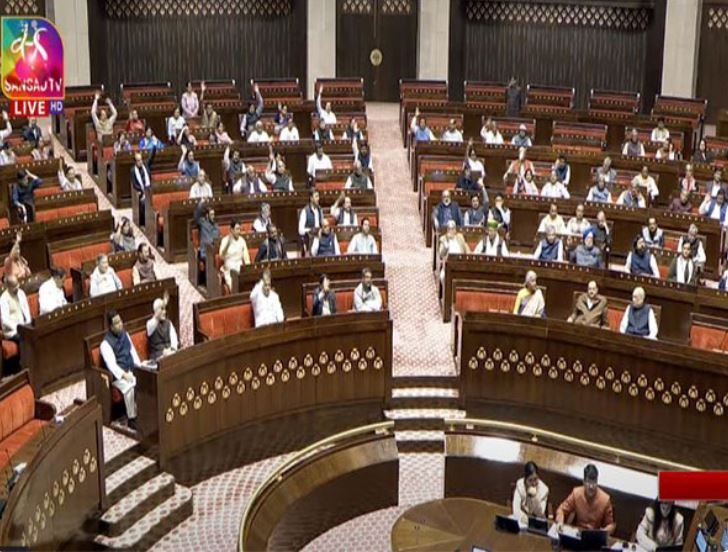


The much-awaited winter session of Parliament commenced today but faced early disruptions leading to the adjournment of both Houses for the day. With 16 bills on the agenda and plans for a paperless Parliament, the Lok Sabha Secretariat advised MPs to opt for digital attendance. The first day included discussions on crucial bills such as the Banking Laws (Amendment) Bill and the Railways (Amendment) Bill in the Lok Sabha and the Bhartiya Vayuyan Vidheyak in the Rajya Sabha.
Winter Session of Parliament 2023: A Detailed Examination
Introduction
The Winter Session of the Indian Parliament is an important event in the nation's calendar, providing a platform for legislators to debate critical issues and pass crucial legislation. The 2023 Winter Session, which commenced on December 7, has been marked by both anticipation and disruptions.
Background
The Winter Session is traditionally held during the months of December and January. This year's session was particularly anticipated due to the large number of bills listed on the agenda, including the Banking Laws (Amendment) Bill and the Railways (Amendment) Bill. Additionally, the focus was on implementing a paperless Parliament, with MPs advised to opt for digital attendance.
First Day Proceedings and Disruptions
The first day of the session witnessed early disruptions, with members of the opposition staging protests over various issues. The Lok Sabha was adjourned for the day after the opposition demanded a discussion on the border situation with China. The Rajya Sabha also faced adjournments due to protests over the arrest of AAP MLA Amanatullah Khan.
Key Discussions and Bills
Despite the disruptions, both Houses managed to discuss crucial bills on the first day. In the Lok Sabha, the Banking Laws (Amendment) Bill, which seeks to strengthen the banking sector, was introduced for consideration. The Railways (Amendment) Bill, aimed at improving railway infrastructure and operations, was also discussed.
In the Rajya Sabha, the Bhartiya Vayuyan Vidheyak (Indian Aviation Amendment Bill) was presented for introduction. This bill proposes to amend the Indian Carriage by Air Act, 1972, and incorporate provisions related to compensation for flight delays and cancellations.
Top 5 FAQs
1. Why is the Winter Session significant? The Winter Session provides an opportunity for parliamentarians to review and debate government policies, scrutinize legislation, and raise public concerns.
2. What are the main bills being discussed this session? Key bills on the agenda include the Banking Laws (Amendment) Bill, the Railways (Amendment) Bill, and the Bhartiya Vayuyan Vidheyak.
3. What caused the disruptions on the first day? Opposition members protested over issues such as the border situation with China and the arrest of an AAP MLA.
4. What is the government's goal of implementing a paperless Parliament? The digital attendance and document sharing aims to improve efficiency, reduce paper waste, and enhance transparency.
5. What are the expectations for the rest of the session? The session is expected to witness further debates on important bills and government policies, as well as discussions on current issues and public concerns.
Conclusion
The Winter Session of Parliament 2023 has commenced with a mix of anticipation and challenges. While disruptions marred the first day, the focus remains on addressing crucial issues and passing important legislation. The session is expected to continue over the next few weeks, providing a vital platform for parliamentary scrutiny and public engagement.

During a public meeting in Bihar, Union Home Minister Amit Shah dismissed any speculation about leadership changes by firmly stating that there is "no seat vacant" in politics. Praising Chief Minister Nitish Kumar and Prime Minister Narendra Modi, Shah urged the people of Bihar to vote for the NDA in the upcoming assembly elections. He also addressed various issues such as the construction of the Ram Temple and the ban on PFI, while emphasizing the NDA's strong leadership in the state.

Union Home Minister Amit Shah expressed his confidence that the BJP will emerge victorious in the upcoming assembly elections in West Bengal. He also criticized Chief Minister Mamata Banerjee and the ruling TMC for their opposition towards the special revision exercise for the voter list. The minister defended the legitimacy of the process and supported the Election Commission, while the opposition claims it is a ploy to manipulate voter lists before the polls.

Union Home Minister Amit Shah criticised the opposition's manifesto promise of providing government jobs in Bihar if they come into power. Calling it "nonsensical", Shah stated that such a promise is absurd and the opposition knows they will never come to power and will not have to fulfil any promises made. He also pointed out that the opposition's manifesto ignores the development strides made in Bihar, such as electricity and clean water reaching every village.

In an exclusive interview with News18 India, Union Home Minister Amit Shah dismissed Rahul Gandhi's allegations of "vote chori" (vote theft) and assured the people of Bihar that the BJP will take action against every single infiltrator in the country. He also addressed concerns about Nitish Kumar's health and stated that the Bihar CM was holding four rallies a day, proving that there was no question of his health being in poor shape. Additionally, Shah criticized the opposition's attempt to create a negative perception about Nitish Kumar.

In a recent interview with News18 India's "Sabse Bada Dangal Bihar 2025", Union Home Minister Amit Shah confidently stated that the NDA will form a government with an unprecedented two-thirds majority in the upcoming Bihar assembly elections. Shah also vehemently denied any concerns raised by the opposition regarding the health of Chief Minister Nitish Kumar, stating that both he and Kumar are holding four rallies a day. This marks a major shift in the political equation in Bihar, as the BJP and JD(U) are contesting an equal number of seats, a first in the state's electoral history.

PM Modi delivered a speech at the Maritime Leaders' Conclave in Mumbai, praising the government's efforts in revolutionizing and modernizing the country's shipping sector. He emphasized the nation's ports as being among the most efficient in the developing world, declaring that India has made significant progress in this area.

Union Minister Dharmendra Pradhan, who is also the BJP's in-charge for the Bihar polls, has strongly criticized Congress leader Rahul Gandhi for his derogatory comments against PM Modi. Pradhan has demanded a public apology from Gandhi for his remarks, stating that they are against basic norms of public discourse. He further added that this reflects the Congress' deep-rooted resentment and frustration towards PM Modi and his leadership. Meanwhile, Rahul Gandhi has kicked off his poll campaign in Bihar with a scathing attack on PM Modi, accusing him of "enacting all types of drama" for votes and running the state through remote control.

Elon Musk's xAI has launched Grokipedia, an AI-powered online encyclopedia to rival Wikipedia. Musk aims for the platform to be a "massive improvement" and free from any political bias. While Grokipedia currently sources content from Wikipedia, Musk plans to have all original content by the end of the year. This development adds to Bihar's political landscape, where leaders like Lalu Prasad and Nitish Kumar have dominated with their OBC politics, while Nitish's developmental narrative has transformed the state's political landscape.

BJP leader Chandrashekhar Bawankule sparked controversy with his statement that party workers' phones and WhatsApp groups are being monitored ahead of local body elections. Shiv Sena leader Sanjay Raut demanded his arrest, alleging that the phones of several Opposition leaders were also tapped. Bawankule clarified his statement, but the Sena leader questioned the involvement of BJP offices and technology networks, calling it a potentially anti-national act.

The Election Commission (EC) has announced the schedule for Special Summary Revision (SIR) of electoral rolls in 12 states and Union Territories (UTs) for the year 2025, excluding Assam due to the ongoing National Register of Citizens (NRC) process. While the BJP has welcomed the announcement, the Congress has raised concerns and questioned the decision. The Chief Election Commissioner (CEC) has stated that Assam has a separate provision in citizenship laws and the NRC process must be taken into consideration, causing potential delays in the SIR preparations. Despite the physical closure of banks in Ranchi and Patna, financial services will remain available through digital and self-service platforms, so customers are advised to use online banking and plan any in-branch visits accordingly.